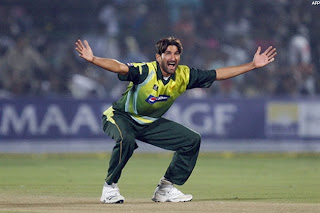Pakistan has suspended the contracts of three cricketers under investigation for spot-fixing during a recent tour of England in a scandal that has rocked the world game, officials said Thursday.
Former captain Salman Butt and fast bowlers Mohammad Asif and Mohammad Aamer face charges of alleged spot-fixing during the tour and have been excluded from Pakistan's current fixtures against South Africa in the United Arab Emirates.
"The central contracts of Salman, Asif and Aamer have been suspended because the PCB (Pakistan Cricket Board) only gives contracts to players who can play for Pakistan," PCB legal adviser Taffazul Rizvi told AFP.
"Until their cases are decided, they can't get any benefits from the Board," Rizvi told AFP.
The scandal broke after a report by British tabloid The News of the World prompted Scotland Yard to launch an investigation into allegations of spot-fixing during the Lord's Test against England in August.
Police raided the team's hotel in London and questioned Salman, Aamer, Asif and bowler Wahab Riaz, but they have yet to level any charges.
The International Cricket Council (ICC) suspended the trio and late last month rejected appeals from Salman and Aamer. Asif withdrew his appeal.
ICC code of conduct commissioner Michael Beloff announced the decision after a two-day hearing, saying the players would have to appear before another tribunal to further their cases.
The ICC said: "As such, the players remain provisionally suspended from all cricket pending the outcome of the independent anti-corruption tribunal which will hear their disciplinary case in due course."
"As Asif chose not to challenge his provisional suspension, he also remains suspended. The ICC will make no further comments."
The ICC code of conduct carries a minimum of five-year punishment if corruption charges are proved. The maximum punishment is a life ban.
The PCB gave annual contracts to its top 18 players in March.
Salman and Asif were contracted to receive 250,000 rupees (2,900 dollars) monthly, while Aamer was placed in a lower category which earned him a monthly salary of 175,000 rupees.
The PCB last month barred the suspended players from using practice facilities at the national cricket academy in Lahore.
Rizvi said the PCB had acted within the rules.
"The ICC's anti-corruption unit code says that no player subject to provisional suspension from the ICC can play, coach or take part in any activity other than attending anti-corruption lectures or rehabilitation programmes," said Rizvi.
"Central contracts are service contracts, so until they can serve their country their contracts will remain suspended," said Rizvi.
Shahid Karim, lawyer for Aamer, said he would comment only after reading the letter from the PCB suspending the players' contracts.
Both Salman and Aamer -- who refused to comment on contracts' suspension late Wednesday -- have lashed out at the ICC.
"It felt as if their (the ICC's) decision had already been made," said Butt on Monday, a day after the appeals were dismissed in Dubai.
"It was not based on a single piece of evidence... After a 12-hour hearing the only so-called evidence they had was the same News of the World article and the same video everyone has seen," said Butt.
Aamer called the appeal dismissal a "victimisation" of Pakistani players.
The ICC has ordered Pakistan to curb alleged corruption and other problems, warning failure to clean up its act could result in sanctions.
No international teams have toured Pakistan since gunmen attacked the Sri Lankan team in March last year, meaning huge financial losses and fears that interest in the sport will start to wane among youth.
In Dubai on Tuesday the former president of the ICC, Ehsan Mani, who is Pakistani, blamed the country's own cricket authorities for the state of the game there and rebuffed suggestions that the ICC was picking on Pakistan













